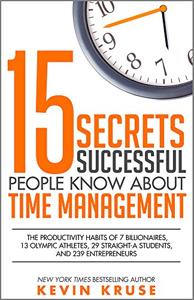
Want to learn the ideas in 15 Secrets Successful People Know About Time Management better than ever? Read the world’s #1 book summary of 15 Secrets Successful People Know About Time Management by Kevin Kruse here.
Read a brief 1-Page Summary or watch video summaries curated by our expert team. Note: this book guide is not affiliated with or endorsed by the publisher or author, and we always encourage you to purchase and read the full book.
Video Summaries of 15 Secrets Successful People Know About Time Management
We’ve scoured the Internet for the very best videos on 15 Secrets Successful People Know About Time Management, from high-quality videos summaries to interviews or commentary by Kevin Kruse.
1-Page Summary of 15 Secrets Successful People Know About Time Management
Overview
Modern life is full of distractions. Whether it’s your phone buzzing in your pocket with the latest tweet, a colleague interrupting you in the middle of an important task or the daily barrage of emails, your time is constantly being stolen from you, minute by minute, hour by hour. And once you’ve lost that time for one distraction, another will come along to distract you again and again until all that time has been wasted away.
To stay on track and avoid time thieves, you need to have some tricks up your sleeve. This passage will get you started by explaining the importance of 1,440 minutes in a day; 321-Zero system; how many books George W. Bush read throughout his presidency.
Big Idea #1: Time is your greatest asset and should be spent wisely.
It’s important to understand that time is precious. We need to use it wisely and spend more time with the people we love. There are ways to do this, but first you must know how valuable your time is.
That’s why the first secret of time management is learning that time is your most valuable asset and you can never get it back. To monitor this precious resource, break it down into 1,440 minutes a day.
The author has a poster in his office that says 1,440 to remind himself of the limited time in each day.
But why use seconds? Why not think about the 86,400 minutes that every day offers? Well, there are a bunch of daily tasks that you can actually do in a minute. This fact makes minutes key to monitoring your time.
Now that you know how valuable time is, it’s time to start prioritizing. The second secret is determining your most important task (MIT). This will have the biggest impact on your life and work. For example, a professor at the University of Missouri-St Louis found that one of the most important productivity determinants was identifying priorities. So pinpointing an MIT is central to time management.
For instance, if a senior executive wants to develop a new app, she might hire someone or create the app herself. Or for a start-up CEO who needs to land an investment from one of his investors, he may want to prepare an impressive presentation. Research has shown that when people have daily MITs (mission imperatives), they are happier and more productive people.
Big Idea #2: Ditch your to-do list for a calendar to accomplish more while stressing less.
A lot of people have to-do lists that are too long. They need to prioritize their tasks and get rid of unnecessary stressors on their list, such as things that aren’t urgent or important enough.
You probably have at least a few tasks that you need to accomplish. The best way to deal with them is by using a calendar, because it’s less stressful than making lists of things you need to do.
Research has found that 41% of to-do lists are not completed. This is because tasks on such lists don’t have a time estimate for completion. As a result, less important or difficult tasks get left undone.
There’s nothing wrong with having a to-do list, but it can cause stress if you don’t complete the items on your list. To avoid that stress, you need to plan out each item on your list and prioritize them by importance. For example, Olympic gymnast Shannon Miller succeeded at spending time with her family, completing school obligations, training for the Olympics and doing media interviews all because she scheduled her time accordingly. This strategy is called time blocking or time boxing, which only requires maintaining a detailed calendar of events. By prioritizing tasks in this way, Miller was able to achieve her goals without unnecessary stress.





